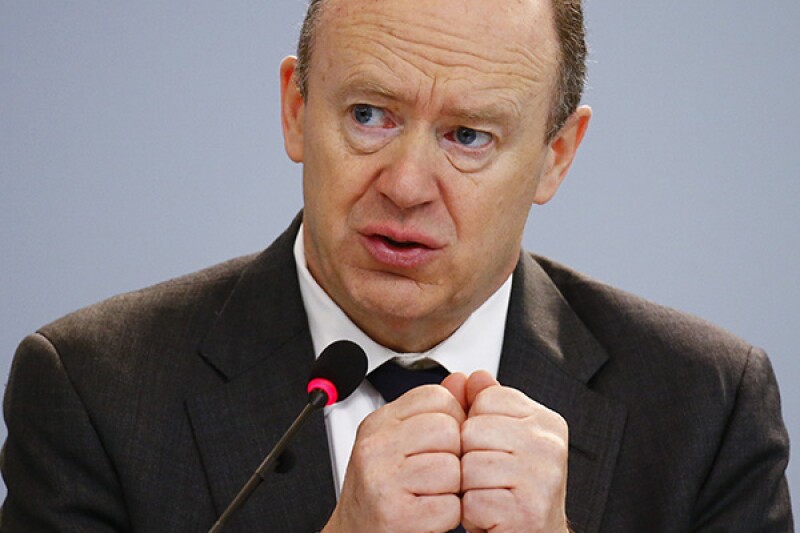
|
Deutsche Bank’s co-CEO John Cryan |
Both men have taken on the tough job of reviving venerable banks that have been left with weakened balance sheets and shredded reputations following the departure of previous top executives.
Both also seem to have been taken aback by the scale of the problems bequeathed to them by their predecessors. Cryan had been on the board of Deutsche Bank before his emergency installation as top executive following the ousting of former co-CEO Anshu Jain last year, so he should have had some grasp of the challenges at the bank. He has nevertheless projected the air of a man who is slightly shell-shocked by the range of issues he has to tackle at the firm, ranging from enormous continuing potential litigation costs to multiple incompatible IT systems that must seem like a metaphor for the historical inability of the bank’s senior managers to play well with each other.
Winters has also taken on an increasingly tight-lipped demeanour as his digging into the books at Standard Chartered has uncovered further examples of problematic loans and risky trades.
When he made an unexpected announcement of the bank’s first annual loss for just over a quarter of a century at Standard Chartered’s results on February 23, Winters made his anger at the actions of his predecessors clear. The near doubling of loan impairments and a trading book write-down that led to the loss “rips at our soul”, Winters said, on behalf of the team he has put together to the clean up the mess at the bank.
He is taking action to channel this anger with an accountability review to see whether compensation can be clawed back from around 150 former and current bank employees whose failures led to the write-downs.
Deutsche would be well advised to announce a similar review and provide a public account of whether it is able to claw back any unvested bonus awards. Cryan and Winters may both run into problems in trying to claw back bonuses from their predecessors at the top of their firms – Anshu Jain at Deutsche and Peter Sands at Standard Chartered – if they cannot be tied to direct involvement in misconduct.
Responsibility
But that should not absolve former top leaders from responsibility for actions taken on their watch.
Deutsche introduced a complicated new compensation policy in early 2014 that was widely touted at the time as a way to align payouts more closely to long-term performance and enable the bank to claw back bonus awards if it uncovers evidence of misconduct.
This extended deferral periods for bonuses and cut payouts for years – like 2015 – where there is an annual loss at group level, though with some provisos about the reductions in the event of Deutsche also meeting its capital targets.
The guidelines appear to give Deutsche relatively wide scope to pursue an aggressive line on bonus clawbacks, if it chooses to do so. For example, up to 100% of awards can be forfeited “in the event that we discover that the original award value was inappropriate because a performance measure is later deemed to be materially inaccurate or if a deal, trade or transaction considered to be attributable to an employee has a significant adverse effect on any Group entity, Division or the Group as a whole.”
The policy also said that entire bonus awards could be rescinded “as a result of misconduct, including but not limited to, dishonesty, fraud, misrepresentation or breach of trust.”
An aggressive CEO could easily argue that former senior managers at both Deutsche and Standard Chartered were ultimately responsible for many deals that had an adverse effect on the overall performance and reputation of their firms.
With times tougher for existing employees and external shareholders of these banks, and capital at a premium, this hypothesis should be tested and bonuses clawed back where possible.
